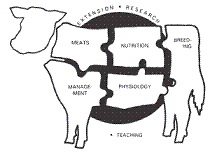Animal Science, Department of

Nebraska Beef Cattle Reports
Date of this Version
2024
Citation
2024 Nebraska Beef Cattle Report
UNL Beef, Institute of Agriculture and Natural Resources, University of Nebraska-Lincoln
Abstract
Implementation of supplemental protein strategies during late gestation has been shown to positively affect postweaning progeny performance. A 2-yr study was conducted to evaluate the effects of late gestation supplementation strategies on reproduction, cow body weight, and calf performance in March-calving mature range cows grazing dormant upland range. Supplementation was individually fed and provided daily with treatments being: 1) no supplementation, 2) 2 lb per day of a 30% CP distillers-based supplement, 3) 2 lb per day of a 30% CP distillers-based supplement with the inclusion of 160 mg/cow daily of monensin, 4) 2 lb per day of a 30% CP distillers-based supplement with the inclusion of 40 g/cow daily of propionate salt. Cows that received any of the 3 supplemental protein treatments gained similar BW; whereas cows that received no supplement gained the least BW during late gestation. Supplementation strategy did influence subsequent reproductive performance with CaProp and Supp cows having the greater pregnancy rates. late gestation supplementation did not influence subsequent calf BW at birth, weaning, and entry into the feedlot. However, late gestation strategy tended to influence steer BS at finishing with offspring from NoSupp dams had the lightest finishing BW. Average daily gain, DMI, and F:G were not influenced by dam's late gestation supplementation strategy. Overall, protein supplementation in general had a positive impact on overall cow-calf performance compared to no protein supplementation. However, cows that were fed protein supplement or protein supplement with the inclusion of propionate salts had increased subsequent pregnancy rates.
Included in
Large or Food Animal and Equine Medicine Commons, Meat Science Commons, Veterinary Preventive Medicine, Epidemiology, and Public Health Commons

